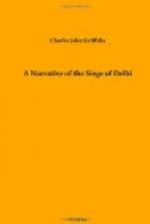There were other officers of the army in camp who had lost wives and relations at Delhi and Meerut, and who behaved in the same manner as C—— d. One in particular, whose wife I had known well, was an object of pity to the whole camp. She was the first woman who was murdered during the outrage at Meerut, and her death took place under circumstances of such shocking barbarity that they cannot be recorded in these pages.
Truly these were fearful times, when Christian men and gallant soldiers, maddened by the foul murder of those nearest and dearest to them, steeled their hearts to pity and swore vengeance against the murderers. And much the same feelings, though not to such an extent, pervaded the breasts of all who were engaged in the suppression of the Mutiny. Every soldier fighting in our ranks knew that a day of reckoning would come for the atrocities which had been committed, and with unrelenting spirit dedicated himself to the accomplishment of that purpose. Moreover, it was on our part a fight for existence, a war of extermination, in which no prisoners were taken and no mercy shown—in short, one of the most cruel and vindictive wars that the world has seen.
From July 10 to 14 there was comparative quiet in the camp; the cannonade continued on each side, but no sorties were made by the enemy.
July 12.—On the morning of the 12th I was detailed for picket duty at the Sabzi Mandi Gardens, to the right front of Hindoo Rao’s house, the picket consisting of 100 men under the command of a Captain. Since the opening of the siege this had been the scene of many sanguinary encounters with the enemy, who put forth all their strength in endeavours to drive in the picket, and so turn our right flank at Hindoo Rao’s house.
The view at first was almost completely closed in; but by the end of July the unremitting labours of the Engineers had cleared away the trees, walls, and buildings in front of the picket for some distance, and the earth-works connecting it with the ridge at Hindoo Rao’s house were also completed.
I can remember no event of interest as occurring on July 12. Few shots were fired at us, and on being relieved the next morning we returned to camp, wondering at the unusual inactivity of the enemy.
July 14.—They were, however, only preparing for another sortie on a grand scale, and on the morning of the 14th the bugles again sounded the “alarm” and the “assembly.” The insurgents poured out of the Kabul and Lahore Gates in great numbers, making, as usual, for the Sabzi Mandi Gardens and the right of the ridge. They kept up a constant fire of musketry and field-artillery; and though our batteries swept their masses with shell and round-shot, they still continued the attack, pressing close to the pickets and Hindoo Rao’s house.
[Illustration: THE SMALL PICKET, SABZI MANDI, FROM THE SOUTH-EAST.]




